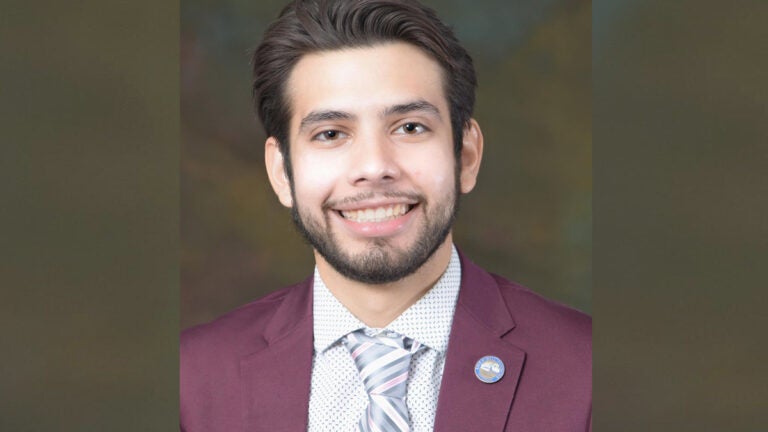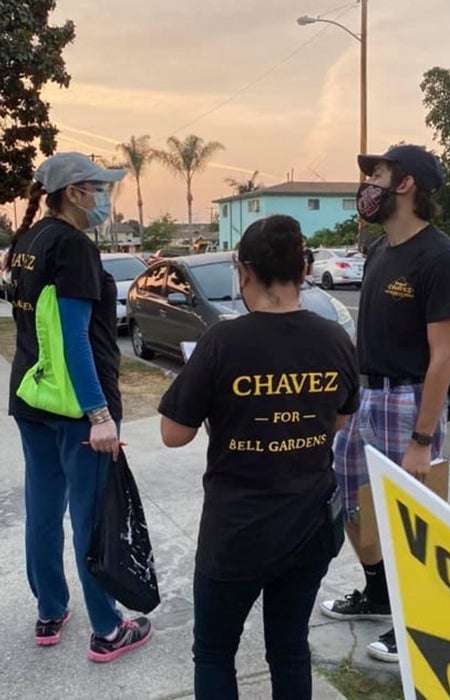
Student Jorgel Chavez is the youngest city council member in L.A. County’s history
In his campaign to be elected to the Bell Gardens city council, Jorgel Chavez spent the fall personally canvassing nearly every street in the Southern California town. Armed with his promotional materials and his skateboard, he traveled from one end of the city to the other, talking to residents about the problems they were facing and his plans for the community.
“There’s about 61 streets in Bell Gardens. My team knocked on 58 of them. I knocked on 40 of them myself, over 50% of the city. People were surprised to see me out in person,” says Chavez, who is set to graduate in May 2021 with a bachelor’s degree in political science from the USC Dornsife College of Letters, Arts and Sciences and a master’s degree in public administration through the Progressive Degree Program at the USC Sol Price School of Public Policy.
And it paid off. In November, Chavez won his election, making him the youngest person to hold a city council seat in Los Angeles County history. As a proud lifetime resident of Bell Gardens and a graduate of the city’s public schools, Chavez says he’s eager to serve the community he loves.

“It means a lot to me, growing up in the city, to be able to give back, to be able to advocate for the people here and for future generations,” he says.
One of Chavez’s professors, Bob Shrum, director of the USC Dornsife Center for the Political Future and the Carmen H. and Louis Warschaw Chair in Practical Politics, was so impressed with Chavez that he ended up donating to his campaign.
“He’s decent, smart, committed to public service and has a commitment to his community. I think he’s got a big future,” Shrum says. “He was a pleasure to have in class. He came and talked to me several times about the fact that he was going to run. He’s exactly the kind of student we hope to produce.”
A political education and a throwback campaign style
Chavez says Shrum and the classes he taught, particularly the “Applied Politics” (POSC 323) course “Message and Media: Great Races from City Hall to the White House,” were part of his inspiration to run. He noted that “Collaborative Governance” (PPD 672), taught at USC Price, gave him the tools to understand how politics really worked at the operational level, from policies and ordinances to working with different government sectors.
A first-generation college student, Chavez also cites the Topping Scholarship as key to having been successful in his studies.
“Norman Topping is dear and close to my heart. The friends, the connections and the foundation that I made at USC are because of Norman Topping,” he said.
While still a student at USC, Chavez decided to run for city council. But while his campaign approach was old-fashioned — he had no media spokesperson, only $6,000 in funding and a volunteer legion comprising mostly his family and his partner’s family — its ideas were not. With his emphasis on, among other issues, government transparency and environmental protection, Chavez says he wanted to run on issues that have long been ignored by people in power.
“Before I ran, countless people told me not to — ‘it’s not your time’ or ‘you’re too young’ — and I can’t tell you how many people told me I didn’t have enough money,” he says. “But I said no, I was going to do this on my own.”
Many people have been in government for four or five decades; change is needed, and young people must be part of it, he said.
For the Bell Gardens election, Chavez ran against four other candidates for two at-large council seats. In southeast L.A. County, he explains, it’s typical for council candidates to run in pairs so as to save money and take advantage of one another’s momentum or base. Despite running against three incumbents — one of whom had been on the council for 21 years — and being the only person to run without a partner, he won the election handily, with 4,256 votes. The second-place winner gained 3,457 votes.
The city’s ‘backyard’
Bell Gardens is about 10 miles south and east of downtown L.A., just past where the 710 narrows from 10 lanes to eight and the large industrial parks and power stations lining the interstate give way to modest houses and strip malls. The noise from the interstate carries through the western part of town. Right at the exit stands the Bicycle Casino, tall and modern … and empty.
With the casino closed due to the COVID-19 pandemic, the town has lost about half of its revenue, Chavez says. “We’re at a deficit,” he admits, though he adds that a new sales tax measure has resupplied some of the missing funds.
Chavez is also focused on Bell Gardens’ environmental issues, many of which are shared by neighboring cities, as a cause for concern. For one thing, the residents lack park space. For another, the pollution from the 710 is ever-present.
“There’s a reason we have enormous rates of asthma — it’s the 710 freeway. Sometimes Bell Gardens, along with other southeast neighbors, have been seen as the backyard of L.A.,” he says. “When we think of L.A., we think of the Santa Monicas and the Hollywoods and the Malibus, but it’s not all that. Other cities are here, and we have some of the most diverse, some of the most culturally oriented populations.” Glossing over lower-income, mostly Latinx-populated towns located near freeways and industrial parks has hazardous consequences for those communities, he explains.
As for his next steps (the city council position, in theory a part-time job, “doesn’t really pay the bills,” Chavez notes), he is thinking of going into city administration, or perhaps pursuing a Ph.D. in urban planning. He hopes his election experience will convince other, even younger people to seek out positions in government, bringing with them the change they want to see.